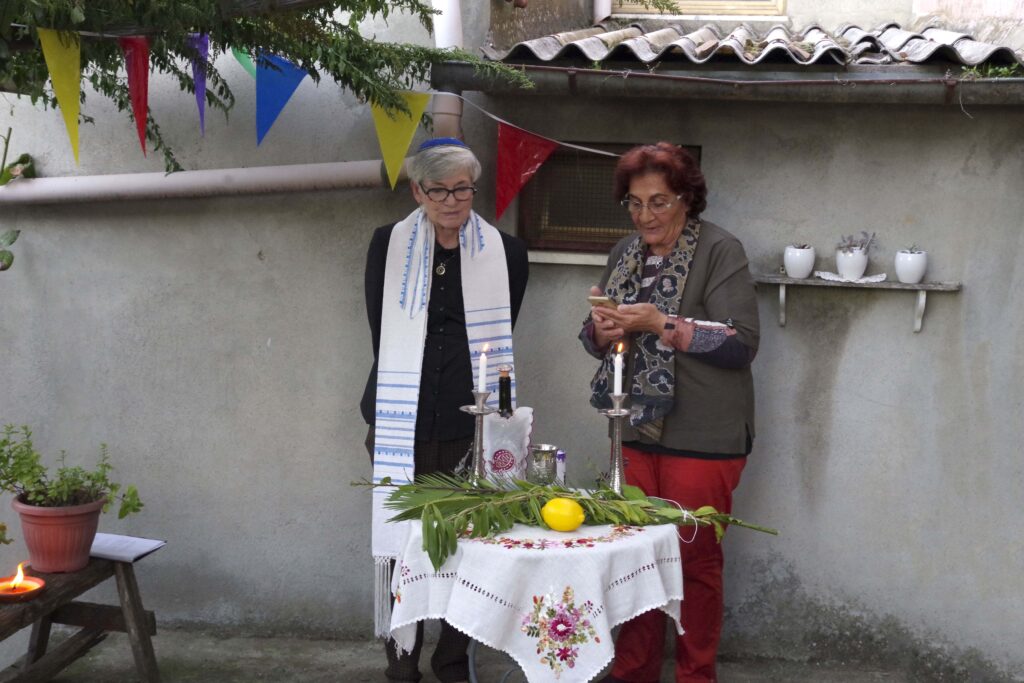The etrog is shaped like the heart muscle, meaning that all that we do to make the world a more just place must be done with love and compassion. With a good heart
By Rabbi Barbara Aiello
Here in Calabria we stand in solidarity with Jews all over the world as we celebrate the festival that my daughter often called “Jewish camping.” We Jews are eating and even sleeping outdoors in a temporary little hut called a “sukkah,” as we observe the holiday of Sukkot.
In all of the Torah the sukkah is the only structure that we are commanded to build. The Torah requires us to construct the sukkah in a manner that allows us to see through the roof and look up to the stars so that we can fully experience our connection to the natural world.
The sukkah reminds us of the time when we Jews lived in the wilderness and it asks us to remember how fragile and how temporary all buildings really are – even those constructed with bricks and mortar or with stone, steel or cement.
The blessings under the sukkah are as important as the structure itself, especially the ceremony that features a strangely shaped fruit and a bouquet of branches – Jewish symbols that offer an important lesson.
Interestingly the Sukkot fruit, called “etrog” in Hebrew and “cedro” in Italian, is native to Calabria. A fabulous etrog farm functions only several miles from our synagogue in a town called Santa Maria del Cedro. I am often asked if I collect my etrogim there. Sadly, no. As a woman rabbi who wears a kipah, I was prohibited from entering the farm!
Here in Calabria we hold the “etrog,” fruit against the “lulav” or branch bouquet to remind us that each of these four species symbolizes an important Kabbalistic theme. The small, almond shaped leaves of the myrtle branch symbolize our eyes, reminding us that we must not close our eyes to injustice in the world. The leaf on the willow branch, long and thin, represents our mouth – meaning that it is not enough to acknowledge injustice. Instead when we’ve seen injustice we must speak up against it.
The palm branch, long, stiff and unbending, symbolizes our backbone and tells us that we need strength to stand up to injustice and strength to take action. Finally, when we take the branch bouquet, the lulav, and hold it against the etrog fruit we notice that the etrog is shaped like the heart muscle, meaning that all that we do to make the world a more just place must be done with love and compassion – with a good heart.
Here in Calabria, at Sinagoga Ner Tamid del Sud, we Calabresi enjoyed our mountain top sukkah, built beneath the “pergola,” the grape arbor where we regularly make our Shabbat Kiddush blessings, More than fifty of our members, friends and neighbors joined together to celebrate this joyful Jewish festival and to emphasize this happy occasion we used paper in the form of apples to record our thoughts on what is good about our world.
From “genitori e nonni,” (parents and grandparents) to “fiume e montagne” (rivers and mountains), our sukkah decorations were inscribed with personal blessings and messages of hope.
In the glow of bright full moon we dipped apples in honey, enjoyed music, song, and a visits from biblical guests (“ushpizin,” a 16th-century custom which originated among the Kabbalists) and shared family stories and precious memories.
We are Italian “b’nei anousim” who are beginning to discover and embrace our Jewish roots, We are reclaiming traditions that were stolen from us during Inquisition times – and the tradition of Sukkot is only one of many Jewish celebrations, festivals and memorials that point the way to our return to Judaism and offer us a heartfelt “Welcome Home.”
Rabbi Barbara Aiello has served as congregational rabbi for 20 years. Currently she is rabbi of Sinagoga Ner Tamid del Sud, the first and only synagogue in Calabria in 500 years since Inquisition times and the first Reconstructionist affiliated synagogue in Italy. She is Italy’s first and only female rabbi.

Thank you so much, Rabbi Barbara, for this article. I had never heard this interpretation of the etrog and lulav, but it speaks to me. I am so glad you sent it. Mille, mille grazie,
Gabriella
P.S. My Italian is no longer good enough to leave this message in Italian – so sorry.
Rabbi Barbara. My mother and father, aunt and brother, would love to come to Italy and celebrate our Hebrew roots together with you during these moadim of Hashem. Thank you for reaching out to the Aiello and Sorrentino families here in the nations, USA.
We are so greatful to you for your commitment and walk. For revealing more to us of where we came from, and where we are returning to.
Shalom and blessings to you! A relative who we did not know existed.